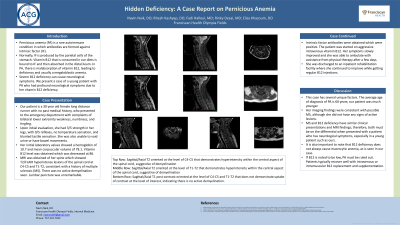Tuesday Poster Session
Category: Stomach
P5089 - Hidden Deficiency: A Case Report on Pernicious Anemia
Tuesday, October 29, 2024
10:30 AM - 4:00 PM ET
Location: Exhibit Hall E

Has Audio

Navin Naik, DO
Franciscan Health Olympia Fields
Tinley Park, IL
Presenting Author(s)
Navin Naik, DO1, Ritesh Kashyap, DO2, Fadi Halloul, MD2, Rinky Desai, MD2, Elias Khazoum, DO2
1Franciscan Health Olympia Fields, Tinley Park, IL; 2Franciscan Health Olympia Fields, Olympia Fields, IL
Introduction: Pernicious anemia (PA) is a rare autoimmune condition in which antibodies are formed against intrinsic factor (IF). Normally, IF is produced by the parietal cells of the stomach. Vitamin B12 that is consumed in our diets is bound to IF and then absorbed in the distal ileum. In PA, there is malabsorption of vitamin B12, leading to deficiency and usually a megaloblastic anemia. Severe B12 deficiency can cause neurological symptoms. We present a case of a young patient with PA who had profound neurological symptoms due to her vitamin B12 deficiency.
Case Description/Methods: Our patient is a 30 year old female with no past medical history who presented to the emergency department with complaints of bilateral lower extremity weakness, numbness, and tingling. Upon initial evaluation, she had 3/5 strength in her legs, with 0/5 reflexes, no temperature sensation, and blunted tactile sensation. She was also unable to void urine or have bowel movements. Her initial laboratory values showed a hemoglobin of 10.7 and mean corpuscular volume of 78.1. Vitamin B12 level was obtained which was decreased at 86. MRI was obtained of her spine which showed T2/FLAIR hyperintense lesions of the spinal cord at C4-C5 and T1-T2, consistent with a history of multiple sclerosis (MS). There was no active demyelination seen. Lumbar puncture was unremarkable. Intrinsic factor antibodies were obtained which were positive. The patient was started on aggressive intravenous vitamin B12. Her symptoms slowly improved and she was able to ambulate with assistance from physical therapy after a few days. She was discharged to an inpatient rehabilitation facility where she continued to improve while getting regular B12 injections.
Discussion: This case has several unique factors. The average age of diagnosis of PA is 60 years; our patient was much younger. Her imaging findings were consistent with possible MS, although she did not have any signs of active lesions. MS and B12 deficiency have similar clinical presentations and MRI findings; therefore, both must be on the differential when presented with a patient who has neurological symptoms, especially in a young patient such as ours. It is also important to note that B12 deficiency does not always cause macrocytic anemia, as is seen in our case. If B12 is noted to be low, PA must be ruled out. Patients typically recover well with intravenous or intramuscular B12 replacement and supplementation.
Disclosures:
Navin Naik, DO1, Ritesh Kashyap, DO2, Fadi Halloul, MD2, Rinky Desai, MD2, Elias Khazoum, DO2. P5089 - Hidden Deficiency: A Case Report on Pernicious Anemia, ACG 2024 Annual Scientific Meeting Abstracts. Philadelphia, PA: American College of Gastroenterology.
1Franciscan Health Olympia Fields, Tinley Park, IL; 2Franciscan Health Olympia Fields, Olympia Fields, IL
Introduction: Pernicious anemia (PA) is a rare autoimmune condition in which antibodies are formed against intrinsic factor (IF). Normally, IF is produced by the parietal cells of the stomach. Vitamin B12 that is consumed in our diets is bound to IF and then absorbed in the distal ileum. In PA, there is malabsorption of vitamin B12, leading to deficiency and usually a megaloblastic anemia. Severe B12 deficiency can cause neurological symptoms. We present a case of a young patient with PA who had profound neurological symptoms due to her vitamin B12 deficiency.
Case Description/Methods: Our patient is a 30 year old female with no past medical history who presented to the emergency department with complaints of bilateral lower extremity weakness, numbness, and tingling. Upon initial evaluation, she had 3/5 strength in her legs, with 0/5 reflexes, no temperature sensation, and blunted tactile sensation. She was also unable to void urine or have bowel movements. Her initial laboratory values showed a hemoglobin of 10.7 and mean corpuscular volume of 78.1. Vitamin B12 level was obtained which was decreased at 86. MRI was obtained of her spine which showed T2/FLAIR hyperintense lesions of the spinal cord at C4-C5 and T1-T2, consistent with a history of multiple sclerosis (MS). There was no active demyelination seen. Lumbar puncture was unremarkable. Intrinsic factor antibodies were obtained which were positive. The patient was started on aggressive intravenous vitamin B12. Her symptoms slowly improved and she was able to ambulate with assistance from physical therapy after a few days. She was discharged to an inpatient rehabilitation facility where she continued to improve while getting regular B12 injections.
Discussion: This case has several unique factors. The average age of diagnosis of PA is 60 years; our patient was much younger. Her imaging findings were consistent with possible MS, although she did not have any signs of active lesions. MS and B12 deficiency have similar clinical presentations and MRI findings; therefore, both must be on the differential when presented with a patient who has neurological symptoms, especially in a young patient such as ours. It is also important to note that B12 deficiency does not always cause macrocytic anemia, as is seen in our case. If B12 is noted to be low, PA must be ruled out. Patients typically recover well with intravenous or intramuscular B12 replacement and supplementation.
Disclosures:
Navin Naik indicated no relevant financial relationships.
Ritesh Kashyap indicated no relevant financial relationships.
Fadi Halloul indicated no relevant financial relationships.
Rinky Desai indicated no relevant financial relationships.
Elias Khazoum indicated no relevant financial relationships.
Navin Naik, DO1, Ritesh Kashyap, DO2, Fadi Halloul, MD2, Rinky Desai, MD2, Elias Khazoum, DO2. P5089 - Hidden Deficiency: A Case Report on Pernicious Anemia, ACG 2024 Annual Scientific Meeting Abstracts. Philadelphia, PA: American College of Gastroenterology.
